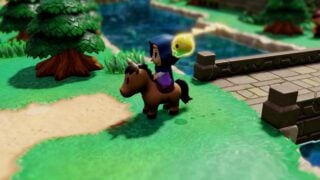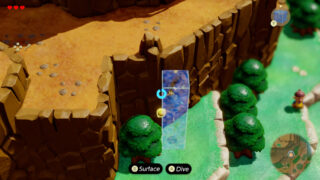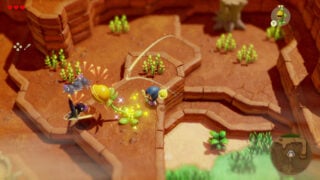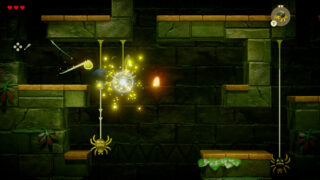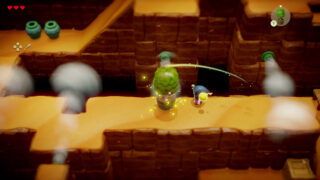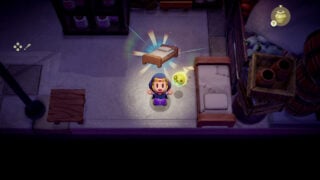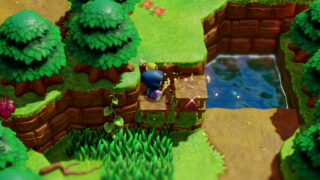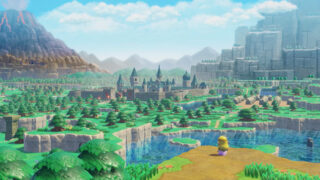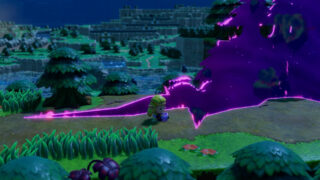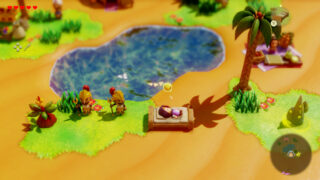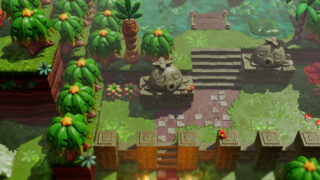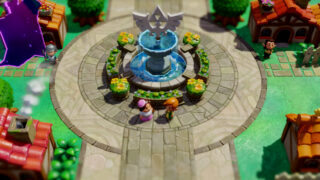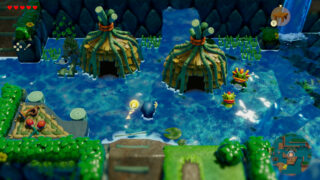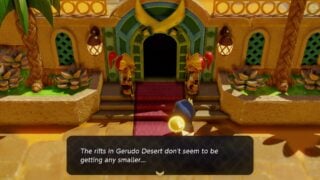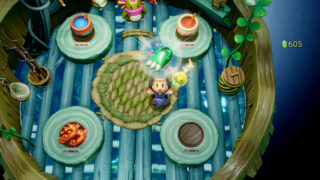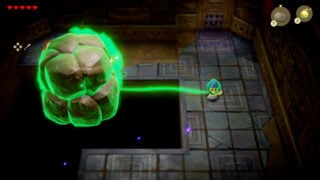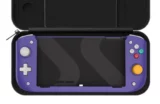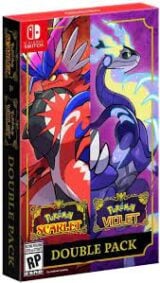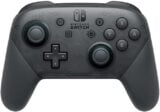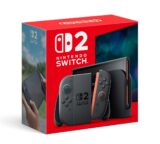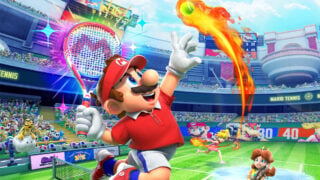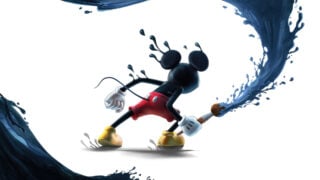Zelda: Echoes of Wisdom is stuck in the void between new and old
Grezzo’s first all-original Zelda introduces plenty of good ideas, but isn’t able to realise their potential
- Key Credits
- Eiji Aonuma (Producer), Tomomi Sano (Director (Nintendo)), Satoshi Terada (Director (Grezzo))
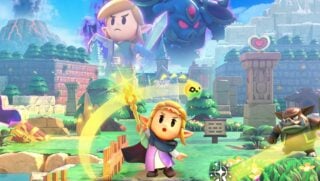
There’s a lot to like about The Legend of Zelda: Echoes of Wisdom. For a start, it’s the first Zelda game to star the titular Princess as its main protagonist, after decades in the support role; it introduces a bold new mechanic to its core gameplay; and the longtime remake studio Grezzo finally gets a well-deserved shot at an original game.
It also has a beautiful toybox art style – transitioned from 2019’s delightful Link’s Awakening remake – that makes its world a joy to look at; and introduces a generously-sized Hyrule map with plenty of fun characters and touching story moments to discover.
But despite great first impressions, Echoes of Wisdom eventually unravels into a surprisingly uneven Zelda adventure, which struggles to deliver on its initial promise. By the end, few of the game’s headline mechanics felt like they were utilised to their potential, and, combined with a mostly predictable story and dungeons, this means that it ultimately feels less essential than the series’ other modern 2D entries.
Echoes of Wisdom is a classic-style, top-down adventure that sees Princess Zelda forced into the lead, after a series of mysterious rifts appear around Hyrule, swallowing up people, objects, and even the King of Hyrule and Link. The Princess’s story starts with Tri, an ethereal creature who hands over a wand known as the Tri Rod, which Zelda can then use to create copies of objects and enemies in the world, known as ‘echoes’.
With no sword, shield or traditional items to speak of, echoes are supposed to be Zelda’s main means of solving puzzles and defeating enemies in the game. Once defeated and copied, you can summon any enemy in the game (though each takes up a finite number of points, depending on how powerful they are), and they will fight on your behalf. You can also summon select items, such as flaming torches or blocks of ice, to solve puzzles or traverse the environment.
It’s a bit like Zelda’s Pokémon adventure, with players quickly compelled to catch ‘em all. New echoes become like new power-ups; there are trampolines to bounce off, spiders to make web climbing ropes, and wind cannons for clearing secret-filled sand dunes.
There are over a hundred echoes to find and copy in the game, each indicated by a shining effect on them in the game world. Initially, they bring some novel gameplay to Echoes of Wisdom’s otherwise traditional dungeon-clearing setup. An opening section, for example, will have you manifesting slabs of meat to distract monsters, or smashing pots to alert guards.
The Hyrule here – which is totally original, except for, disappointingly, the occasional performance issues which have seemingly been carried over from the last game – features plenty of verticality, while the side-scrolling sections from Link’s Awakening also return. So, it’s unsurprising that the Tri Road mechanic is frequently utilised for platforming, and it’s here we found the feature most enjoyable.
Assembling towers made of beds and tables to scale cliff faces is child-like fun, especially when you’re skipping ahead to new areas which, in past games, you probably wouldn’t be able to reach, like using a naughty cheat code.
“There are over a hundred echoes to find and copy and initially, they bring some novel gameplay to Echoes of Wisdom’s otherwise familiar dungeon-clearing setup”
Pleasingly, some of the ‘chemistry’ elements introduced in the newest 3D titles have also found their way here, which gives the world a sense of life previously not present in the top-down games. For example, Flaming enemy echoes can be used to set grass alight, slowly spreading a little forest fire. There are also plenty of satisfying physics puzzles, which require players to utilise the weight and properties of objects, such as by manifesting a floating crate or sinking boulder when in water.
However, this being a top-down game, the spectrum of possibilities offered to players isn’t at the level of a vast, systems-driven 3D world like the recent Switch games. If players can tackle puzzles in multiple ways, it’s more about deciding which echo you’re going to light a lantern or cross a gap with, rather than building a monstrous custom machine to fly you directly to the final boss.
The freedom is welcome, but like with Breath of the Wild and Tears of the Kingdom, it will be down to your individual taste whether you find a well-designed linear puzzle more satisfying, or the feeling you get when you’ve figured out how to skip an entire stretch of obstacles by riding on the back of a manifested flying floor tile.

Combat is, unfortunately, (no pun intended) the weak link. Summoning enemies to fight on your behalf, while initially amusing, eventually wears thin. Weaker enemies like Zol or Keese are good for about one hit before they’re defeated and you have to summon more, while stronger enemies such as a spear-wielding Moblin cost more energy points and are tediously sluggish to fight.
Although Zelda gains more energy points during the story, allowing players to summon more enemies at once, the mechanic never meaningfully evolves, and you’re mostly stood there, like in a Tower Defence clone, watching mostly the same AI Peahat you’ve been using all game slowly chip away at a boss.
Despite having the choice of over one hundred echoes, we mostly stuck to the same ones throughout the game, and few encounters ever challenged us to change our tactics, beyond maybe swapping a fire bat for an ice one.
“Although Zelda gains more energy points during the story, allowing players to summon more enemies at once, the mechanic never meaningfully evolves”
Almost in acknowledgement of how dull combat with the AI minions can become, very early on the game actually adds the ability for Zelda to transform into a spirit version of Link – sword, bow et al – known as ‘Swordfighter’, allowing you to temporarily participate in combat just like a traditional Zelda game, for as long as an energy meter lasts.
While we hoped Swordfighter wouldn’t feel like a cop-out, it really doesn’t add much to the experience other than further eroding the appeal of echoes for combat. Most boss encounters are fought with both Echoes and Swordfighter in tandem, but this is ultimately an awkward compromise that’s left feeling neither unique, nor as satisfying as collecting and using your own powerups like in past Zeldas.
It also contributes to the feeling that, on her playable debut, Zelda as a character isn’t differentiated as much as we’d have liked from Link, especially as a silent protagonist. Narratively, there are scenes inside the Hyrule Castle walls, where we’re shown hints of the royal soap opera that could’ve been, but sadly it’s not meaningfully explored.
Beyond the echoes, there’s a welcome foundation of Breath of the Wild systems taking route within the classic Zelda formula here, like the ability to craft recipes or wear equipment for certain effect modifiers (like hot or cold resistance). As well as hearts and rupees, Zelda will find all kinds of ingredients during her travels, and players can take them to specific merchants to brew smoothies, with different combinations wielding different effects.
Zelda even learns an Ultrahand-like ability that lets her carry and pull physics objects from afar. But again, much like with the echoes, the game never fully commits to any of these features (there’s arguably just one small section in the main path where you actually need to use a smoothie, for example), and by the end, they’re left feeling like a bit of an afterthought.
It doesn’t help that the experience that these systems are wrapped around, while enjoyable, often charming and well crafted, is an otherwise staunchly traditional Zelda adventure, which – bar one or two examples – offers little surprise for series stalwarts.
While there is some choice in terms of order, the adventure is an otherwise predictable succession of fire, ice, forest and water dungeons, stretched out by frequent visits to the mysterious rifts around Hyrule, called the Still World, which sadly are less enjoyable to explore – often involving item hunts – than their otherworldly look suggests.
Echoes of Wisdom is at its best when it has the confidence to explore its ideas in more depth, which it sadly doesn’t do enough. There are sections in the story in which Zelda loses her Swordfighter ability, or when she can only use items in the environment to solve puzzles, and we’re given a glimpse at how much more considered the copy-paste gameplay could’ve been under restrictions.
There are even a series of speedrun levels hidden in the corner of Hyrule, where players are challenged to complete custom dungeon rooms as quickly as possible, using only the items and enemies they can clone from that area. We would’ve loved to have seen this idea extended into the main dungeons because it would arguably have made for more memorable challenges than what we ended up with.
The potential for a special Zelda adventure is present in Echoes of Wisdom’s ideas, but uneven execution means it’s neither as mechanically refreshing and satisfying as A Link Between Worlds, or memorable and well-crafted as Link’s Awakening. There’s plenty to like, and not enough to love, which for a series like Zelda, is less than we’ve come to expect.
Despite some ambitious ideas, beneath the surface Echoes of Wisdom is a surprisingly uneven Zelda adventure. Few of its headline mechanics are utilised to their potential which means that, while enjoyable and charming, it ultimately feels less essential than other modern 2D entries.
- Explore one of Zelda's prettiest Hyrules
- Enjoyable platforming and physics puzzles
- Fun characters and touching story moments
- Echoes are less enjoyable for combat
- Many new features feel like an afterthought
- Link's Awakening's performance issues return
